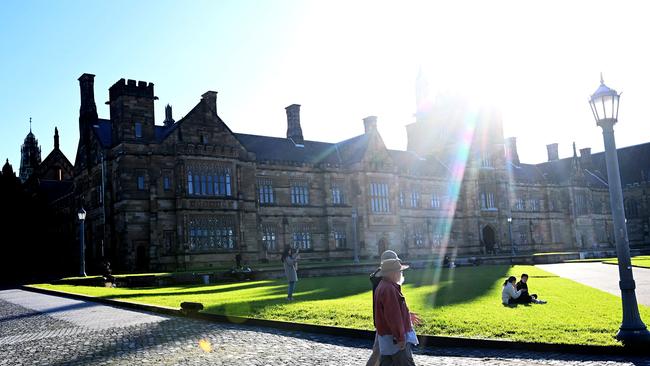We’ve got issues, but we’re still a lucky country

Australia is a country on the rise. On almost every economic and social indicator you choose, we are close to historic success. Health, crime, living standards, employment, you name it, in a world beset by decline and extremes, Australia is a positive example to the world.
Some of the 20th century cliches still ring true: Australia is the lucky country. But are we run by second-rate people who share this luck, as posited by Donald Horne? A nation on the rise does not equate to one that exists as a utopia – permanently in a state of bliss as if apart from the world.
Rather it’s one that can withstand shocks and make steady progress towards a better future for its citizens. In this regard, Australia is a very lucky country. Perhaps we have been so lucky that it gives us the latitude to believe that we did nothing to deserve our strengths. That in the face of difficulty we will give up and fall into the dangerous sclerosis that is choking so many other Western democracies.
Much has been made of our declining life expectancy. A child born today can expect to live about 81.3 years – a decline of 0.1 years since 2022 but the same as someone born just a few years earlier in 2019. Over this same period, the US experienced a 0.4-year decline from a starting point of 78.8 – a larger decline from a lower base. This is not an isolated experience. Life expectancies across the OECD have fallen.

Over the decade after the end of the resources boom, real disposable income per capita has increased by an average of 0.9 per cent per year. Meanwhile Australia has maintained a government debt-to-GDP ratio of 55 per cent, or half the OECD average of 110 per cent in the post-Covid period. The employment-to-population ratio is at a record high at 64.4 per cent, while underemployment for men and women has fallen dramatically across all age groups and industries.
This aggregate increase in participation is largely driven by older workers joining the workforce in greater numbers. Contrary to the popular conception of an ageing population, the IMF projects that healthy ageing policies facilitating workforce participation will add 0.5 percentage points to our GDP growth over the next 25 years. Health services spending will also increase in the coming decades, yet here too there is strong progress. In a report published last year, the Productivity Commission found healthcare productivity grew at approximately 3 per cent per year from 2011-12 to 2017-18 after accounting for improvements in quality.
Some 51.5 per cent of Australians between 25 and 64 hold tertiary qualifications, behind only four other countries in the OECD. It is perhaps no surprise that our human development index, which considers the average years of education, income and life expectancy, places us seventh in the world.

There are few countries with whom we would wish to swap places, yet challenges remain. Cost-of-living pressures are not a unique phenomenon in Australia. Neither is housing affordability, a mental health crisis or any number of other challenges.
The question remains: is this the sign of a nation that structurally cannot solve the problems that beset it? Are we really in decline? The metaphor that stands out to me comes from another much misunderstood book, The End of History and the Last Man, in which Francis Fukuyama talks about nations as wagons on a trail.
Some are falling behind, some are going (temporarily) in the wrong direction, but all are trundling towards liberal democracy. In many ways our national progress resembles this. Sometimes we make head-scratching policy choices, while entertaining silly debates over pub lunch tax credits. But inexorably, by virtue of our political institutions, we move forward. No doubt this is a hard argument for some to accept, and past success is no guarantee of future performance. Yet neither is a moment-in-time snapshot in a period of global turmoil.
We could point to the relative strengths of our mandatory preferential voting system when compared to those in the US and UK. It is a system that forces our politics to be a process of debate and of winning over the centre. But others have made this point at length.
Rather, I would draw attention to the work done by our next generation of leaders and thinkers, working to win over support in the marketplace of ideas. One example is the rise of the grassroots YIMBY (Yes in My Back Yard) movement, which has had some success, most recently in NSW. Zoning reform is a (relatively) bipartisan, evidence-based policy solution to one of the great challenges besetting developed economies – housing supply. There is a long way to go, but that is what action on the housing crisis looks like: slow and steady progress at the level where the problem can be solved – state and local governments.

Productivity growth is another of those wicked problems that exists across countries and which has even fewer obvious policy levers than housing.
Labour market reform is difficult but clearly necessary. A Labor government traditionally finds it more difficult to institute this type of reform. Yet here too we find incremental but necessary progress. The move to restrict the use of non-compete clauses in employment contracts is an important step to restoring labour market dynamism – one aligned with conclusions drawn from careful economic analysis by my colleagues at the e61 Institute.
Even the supposedly intractable problem of globally declining fertility is the subject of careful study that shapes policy choices. The decision to have children is a deeply personal one that has implications for the future of the country. A recent study by e61’s Pelin Akyol found raising the age pension eligibility age decreased fertility rates because grandmothers were less able to provide childcare.
Arming policymakers with knowledge of these trade-offs will help them understand the consequences of their actions. Voters will make up their own minds. It’s undeniable there are problems in Australia. Yet we have also never had such a diversity of people working to solve problems than we do now. Far from declining, the number of talented people navigating these complicated times has only multiplied. Even in a country with so much untapped potential as Australia, success is not guaranteed. There is no certainty we can continue to improve our quality of life and standard of living. But to say we are a nation in decline is premature. Perhaps it is time to acknowledge we make our own luck.
Zachary Hayward is an economist at the e61 Institute.



